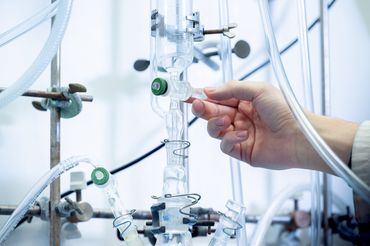After Graduation
Graduates of the Chemistry programme acquire in-depth subject knowledge as well as disciplinary and interdisciplinary skills, enabling them to confidently enter the national and international job market. Upon completion of their studies, they will be able to conduct research and development of chemical raw materials and compounds, plan and execute laboratory analyses and research projects, and evaluate results in accordance with good scientific practice, in order to publish them. They may also formulate professional opinions, assessments, and expert reports or may find employment in marketing and corporate strategy.
Possible professional fields and activities include:
Teaching and Research
When pursuing a career in teaching and research, chemists can enter scientifically oriented research institutions and university institutes. They plan research projects, conduct analytical, preparative, and synthetic work, analyse the results, as well as write and publish research reports. Furthermore, they deliver lectures and presentations and supervise student work in both major and minor programmes in chemistry.
Chemical Industry
In the industry, opportunities abound particularly in areas such as product development, translating fundamental knowledge into innovations, chemical analysis of raw materials, intermediates, products, and waste materials, recipe adaptation, production management, chemical management, and regulatory compliance.
In the industrial production of chemical and pharmaceutical products, graduated chemists conduct laboratory analyses or oversee and control the production process regarding quality, environmental compatibility, and business requirements.
They often collaborate with personnel from process engineering, production, and process automation. In this context, they may take on project management roles as well as planning and installing large-scale facilities. They ensure appropriate quality standards, develop validation procedures, or oversee and control systems and processes concerning product innovation, profitability, quality, and (environmental) compatibility.
Graduated chemists can also engage in dialogue with government agencies and regulatory authorities and be active in public relations. Patent law, marketing, and sales are also areas of their expertise.
Further Industries
In addition to the chemical industry, they are also active in other sectors: wherever chemical precursors are further processed or environmental impacts need to be monitored, such as in the automotive industry (battery, surface treatment, foams, recycling, combustion technology), coating technologies and corrosion protection, energy sector, logistics, and medical technology.
Public Service
The broad field of public service also offers chemists job opportunities in environmental protection, monitoring and testing, authorisation, waste management, as well as in customs, police, or fire departments. They produce reports and documentation (e.g., in food and environmental analysis, for forensic or archaeological purposes) and can develop guidelines, regulations, legislative proposals, and monitor compliance with them.
Assessment and Advice
In assessment and consultancy roles, chemists can serve as experts, analysts, or consultants advising businesses, companies, organisations, and citizens on matters such as the (environmental) compatibility of chemical substances, as well as on strategic and market-related issues.
Media
In media, especially within specialist publishers as well as consumer and online magazines and media, chemists can effectively utilize their expertise and acquired interdisciplinary skills as editors.
Occupational profiles in chemistry: Further information
For further information on the variety of occupational profiles in chemistry, please refer to the following resources:
The completion of a Bachelor’s degree in Chemistry qualifies for admission to a scientific Master's degree programme, including at Carl von Ossietzky University of Oldenburg (Master’s Programme in Chemistry). The completion of a Master's degree in Chemistry qualifies one for subsequent doctoral studies, which are also possible at Carl von Ossietzky University of Oldenburg.




